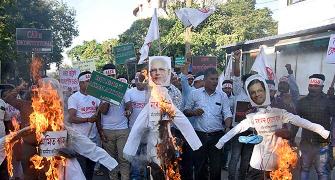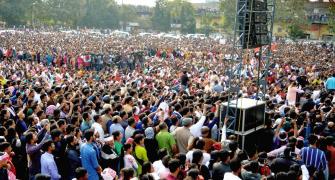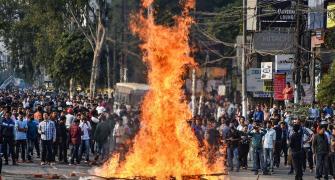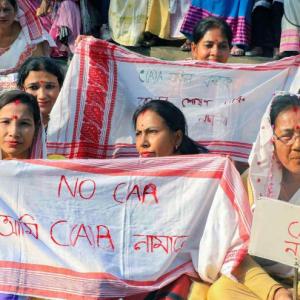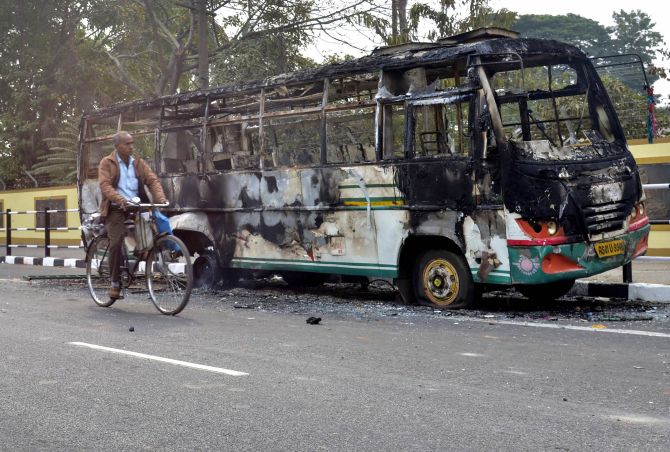The AGP, an ally of the BJP, voted for the Citizenship Amendment Bill in the Rajya Sabha, after Amit Shah's assurance. However, the scale, intensity and, persistence of the anti-CAA protests since then have taken it by surprise.
Radhika Ramaseshan reports.
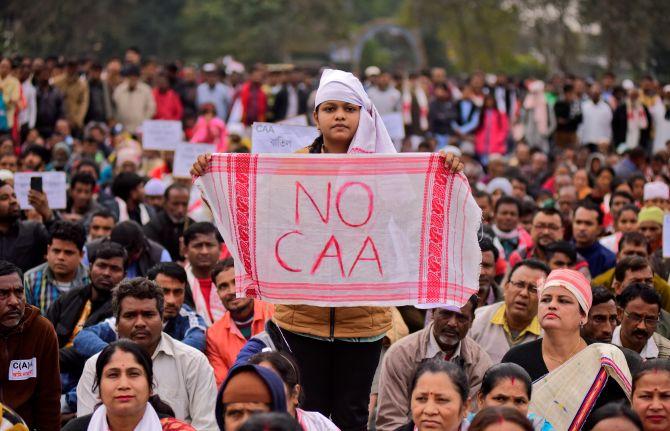
"I am the future but I won't work with the present leadership," proclaimed Prafulla Kumar Mahanta, who no longer holds a formal position in the Asom Gana Parishad, the party he founded in 1985 with his erstwhile compeers from the All Assam Students' Union (AASU).
The AGP's website alludes to Mahanta as a 'leader'.
Now 67 years old, Mahanta was India's youngest elected chief minister at 33, when he moved from the students' dorm of Gauhati University to a bungalow at Dispur.
Several defections, splits, and mergers later, the AGP stands on the verge of another division after the protests over the Citizenship Amendment Act (CAA) ruptured the ethnically sensitive Assam.
The AGP, which aligned with the Bharatiya Janata Party in the last assembly polls in 2016, voted for the Bill in the Rajya Sabha, where it has one lone member, Birendra Prasad Baishya (it has no Lok Sabha representatives).
Mahanta and his long-time associate Brindaban Goswami opposed the vote and alleged that the decision was taken 'unilaterally' by party president Atul Bora, a minister in the BJP-led Assam coalition government and two other colleagues -- Keshab Mahanta and Phani Bhusan Choudhury.
Bora's three-year term as president ends January. The AGP is slated to convene a general house meeting shortly thereafter to elect a new head and that's where the sparks are expected to fly between the factions.
Baishya, a founding-member like Mahanta, was in a dilemma over casting the vote for the CAA even a day before it was tabled and debated in the Upper House.
"We thought Baishya is senior and experienced enough to vote according to his conscience. I haven't spoken to him (since the CAA was enacted) and I don't know why he voted for the Bill," Mahanta said.
Keshab Mahanta and Amguri legislator Prodip Hazarika, who Bora despatched to Delhi to speak with Amit Shah, the home minister, joined the dots.
Hazarika said: "As part of the NDA (National Democratic Alliance) at the Centre and Assam, we discussed the matter with Shah at length before the Bill was tabled and sought his assurance on three issues: The whole of Assam will be kept out of the CAA's purview like Arunachal Pradesh, Nagaland, and Mizoram are, Clause 6 of the (1985) Assam Accord will be scrupulously enforced, and the land rights of the entire Assamese people will be legally and constitutionally protected."
Hazarika wanted a statute proscribing the purchase and sale of land owned by the indigenous Assamese and not just those living in the seven tribal districts that were covered by the Constitution's sixth schedule to be enacted.
Clause 6 of the accord stated that appropriate constitutional, legislative, and administrative safeguards must exist to protect, preserve, and promote the cultural, social and linguistic identity, and heritage of the Assamese people.
Keshab Mahanta said Shah promised that their requirements would be met with 'in due course' after which the AGP directed Baishya to support the citizenship amendment Bill.
Goswami's contention was that the CAA already repudiated Shah's 'assurances' which the AGP sought 'by hindsight'.
"The Bengali-speaking Hindus will flood Upper and Lower Assam because the Barak Valley they inhabited is saturated. Where is the land? More than 228,000 hectares were lost to flood erosion.
"Tea garden labourers, who came several generations ago, still have no land, so why should we allow these migrants in? The indigenous Assamese population is just 47 per cent and this will further go down. We will lose our language and identity," said Goswami.
However, Keshab Mahanta stressed the move to back the CAA was 'carefully thought out'.
"It's not about keeping our ministries. The next election is not too far away (in 2021) and we can easily give up our ministries.
"We felt we have a better say and influence being inside the government than outside," he claimed.
In the 126-member legislature, the BJP has 61 of its own members and 12 of another ally, the Bodo People's Front, and does not need the AGP's 14 MLAs.
Coalition dynamics apart, what took the AGP by surprise were the scale, intensity and, persistence of the protests that engulfed Upper and Lower Assam.
"They were more intense than what we saw at the height of the AASU movement. This was largely leaderless, digitally coordinated and on the ball," said Samujjal Bhattacharya, the AASU's chief adviser.
Afraid of being eased out of the frame, the AASU weighed in, distancing itself from the BJP and the AGP, its progeny.
"Our movement will be non-violent and peaceful but it will continue until the CAA is scrapped," Bhattacharya maintained.
Asked to confirm the report that the AASU would launch another political party, Bhattacharya said, "That will depend on what the people say."
As the AGP -- which moved the Supreme Court to invalidate the CAA after allowing for its passage -- awaits a word from the January 22 hearing, Mahanta said: "We do not want a split. It's important to stay united and show solidarity with the Assamese people against the Centre, the BJP and the CAA."


